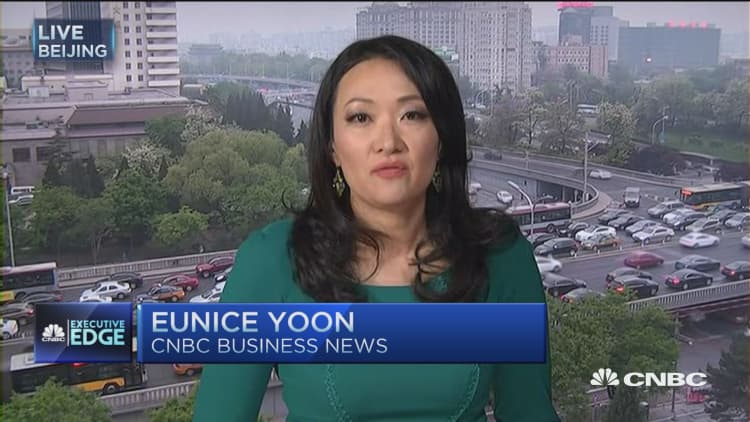
So you've read Apple's latest quarterly results and the numbers are less than encouraging.
The U.S. company's earnings missed on the top and bottom line, breaking a 13-year streak of quarterly revenue growth. Sales in Greater China, which includes mainland China, Hong Kong and Taiwan, fell 26 percent from last year.
Read More Rotten Apple: Stock plunges 8% on earnings, revenue miss
Sounds bad, but is it?
Three reasons to stay calm
The headline numbers aren't great, but that doesn't mean Apple's position in China has significantly deteriorated.
1. Apple retained strength in slowing phone market
The entire China smartphone market, now the world's largest, is maturing after years of explosive growth. Research group Gartner expects smartphone sales in China to rise only 0.7 percent in 2016.
Yet Apple has been holding onto market share. According to I.T. firm International Data Corporation, Apple remained among the top three in terms of market share along with China's Huawei and Xiaomi in 2015 and even rose in ranking in the fourth quarter despite increased competition and a slowing economy.
2. Revenues a year ago were crazy good
Apple CEO Tim Cook made the point that the numbers look worse than they are because revenues grew by 81 percent a year ago.
At that time in China, the iPhone 6 and 6 Plus had just hit the market a few months earlier. Pent-up demand for the new iPhones with bigger screens, a popular feature among Asians who love watching movie clips and TV on their smartphones, led to roaring sales.
So, by comparison, last quarter's revenues for China were smaller but the company still sold a lot of phones.
3. Hong Kong Dollar effect
Another important reason for the fall in China revenues had to do with the Hong Kong dollar. The Hong Kong dollar is pegged to the U.S. dollar, which has been strengthening.
Apple products, which have been snapped up for years in the city by locals, international travelers and mainland Chinese scalpers alike, had suddenly become more expensive. So the sales drop attributed to the currency fluctuations is probably as much a sign of the tougher shopping climate in Hong Kong than a statement specific to Apple.

Two reasons to worry
The founder of one of Apple's rivals in China, LeEco, described the U.S. tech giant as "outdated."
1. Services the next wave?
Jia Yueting said the focus of China's smartphone market is shifting toward services on the phone rather than on the phone itself. He said this is a disadvantage for Apple, known for its well designed hardware, and an advantage for companies like LeEco.
"Apple is a mobile phone company focused on hardware and then software. LeEco is focused on the internet first, then on software, and finally on hardware," he told CNBC. "We have extremely strong resources in content."
LeEco is known as the "Netflix of China." The company recently put out a range of new phones where users can watch nine TV channels at the same time.
In addition, Apple is facing challenges because of the government. Regulators recently shut down its iTunes and iBooks services as part of a wider clampdown on internet content. According to IDC, LeEco only had 1.1 percent of the Chinese smartphone market in 2015. However, analyst Bryan Ma said Jia's ambitions to outmaneuver Apple "shouldn't be underestimated."
2. Losing its tech mojo?
On social media after the quarterly results announcement, Chinese were openly wondering if Apple had lost its technology mojo and "engineering heart." Sales of the Apple iPhone SE have not yet impressed with adoption of the smaller cellphone in China at 0.2 percent, according to mobile engagement platform Localytics.
One vendor in the Chinese city of Luoyang told CNBC that one month into the iPhone SE launch, he has only sold about 100 handsets. He said iPhone 6s had sold five times as fast at the same point after that phone hit the market.
On social media, customers have been voicing their concerns about Apple's apparent lack of technological innovation, saying without it, the company could "end up like Nokia or Motorola."

The real test will be with the iPhone 7. Traditionally Apple gets a big boost whenever a new model is released.
IDC's Ma though says he's worried that the 7 could have only minor technology upgrades and potentially disappoint China's Apple fans at a time when Chinese brands are becoming more competitive and consumers more willing to experiment with new phones.



